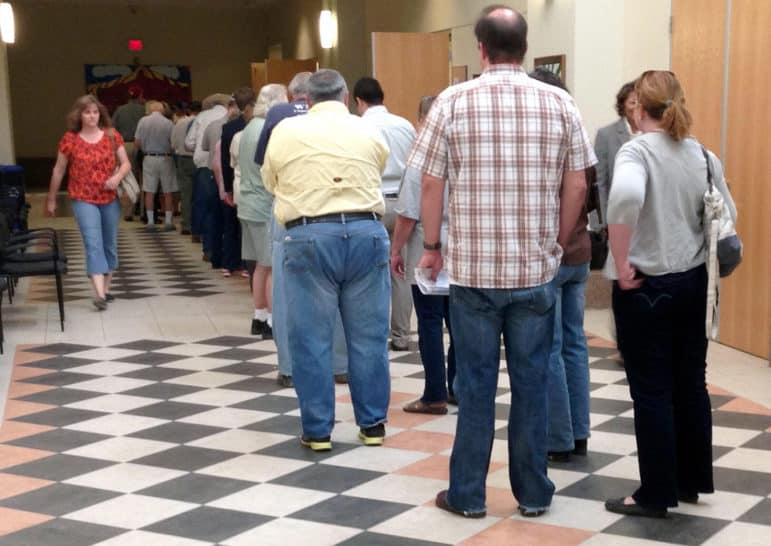
Heath Haussamen / NMPolitics.net
Voters wait to cast ballots in a 2015 Soil and Water Conservation District election in Las Cruces. Turnout for that election was higher than usual but still in the single digits percentage-wise. Many believe consolidating smaller elections would reduce costs, increase public awareness and raise voter turnout.
A bill to consolidate most local elections into one would now let cities opt out and continue holding their own elections.
Democratic members of the Senate Rules Committee made the change to House Bill 174 on Saturday and then unanimously voted to move the legislation forward. Republicans on the committee didn’t show up for the vote.
The amendment to let cities opt out comes after Las Cruces Mayor Ken Miyagishima and some other city officials from around the state opposed being forced to join their elections with those for school districts and other local governments. The House has already approved the bill with the requirement that cities consolidate their elections with others.
That means if the Senate OKs the legislation as it’s currently written the House will have to decide whether to concur with the Senate Rules amendment before Gov. Susana Martinez would get to decide whether to sign the bill. Martinez hasn’t take a position on the legislation.
The compromise that lets cities opt out was apparently necessary to get the votes to proceed. Doña Ana County Clerk Scott Krahling, who has been lobbying for the bill, wrote on Facebook after the Senate Rules vote that he supported the amendment.
“While this isn’t ideal, it is still an improvement,” Krahling wrote. “It means that if this becomes law it will be up to you to let your city councilor know whether or not you want them to make voting easier and to save money by consolidating elections. To me it’s obvious!”
The bill would consolidate elections for school districts, special hospital districts, community college districts, technical and vocational institute districts, learning center districts, arroyo flood control districts, special zoning districts, soil and water conservation districts, and water and sanitation districts beginning in 2019. Cities would be included as well unless their governing bodies approve an ordinance opting out. In 2023 the bill would also add conservancy district elections.
The bill would not consolidate elections for mutual domestics or homeowner associations.
If the bill becomes law, one November you’d vote in partisan races like county commission, state Legislature and U.S. Congress, and the next you’d vote in nonpartisan races the legislation would consolidate. The intent is to increase voter turnout by making it easier for people to understand when and where they can vote and bring more attention to elections by having more candidates and issues on one ballot.
Some school districts and community colleges have also opposed the legislation, which appears to be moving forward in spite of their opposition.